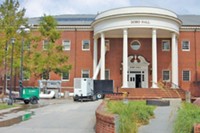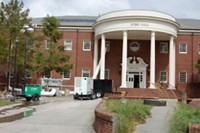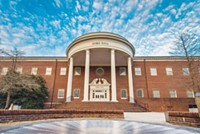Advertisement
Grab your lab coat. Let's get started
Welcome!
Welcome!
Create an account below to get 6 C&EN articles per month, receive newsletters and more - all free.
It seems this is your first time logging in online. Please enter the following information to continue.
As an ACS member you automatically get access to this site. All we need is few more details to create your reading experience.
Not you? Sign in with a different account.
Not you? Sign in with a different account.
ERROR 1
ERROR 1
ERROR 2
ERROR 2
ERROR 2
ERROR 2
ERROR 2
Password and Confirm password must match.
If you have an ACS member number, please enter it here so we can link this account to your membership. (optional)
ERROR 2
ACS values your privacy. By submitting your information, you are gaining access to C&EN and subscribing to our weekly newsletter. We use the information you provide to make your reading experience better, and we will never sell your data to third party members.
Safety
Quake Shakes New Zealand Chemistry
Natural Disaster: Upheaval closes Christchurch area universities
by Carmen Drahl
March 1, 2011
| A version of this story appeared in
Volume 89, Issue 10
Chemists in and around Christchurch, New Zealand, are picking up the pieces from the second major earthquake to rock that country in less than six months. An estimated 240 deaths and a decimated city center have resulted from the 6.3 magnitude temblor, which struck midday on Feb. 22.
A 7.1 magnitude quake hit approximately the same area in September 2010, but it was much less destructive. Christchurch was near the epicenter of both earthquakes.
While it has been disruptive, the February quake apparently has not caused severe damage to universities in region. "We toured the labs immediately after the earthquake and found no significant damage, just a bit of broken glassware and spilled water baths," says Peter A. Gostomski, chemical engineering department head at the University of Canterbury in Christchurch.
September's quake ruined offices and labs, and it damaged an ultrahigh-resolution tandem mass spectrometer beyond repair, says Canterbury's chemistry department chair Antony J. Fairbanks. The full extent of damage to the chemistry building from last week's quake is not clear, but power was off for a few days so many samples stored in freezers may be lost, he says. "The new replacement mass spectrometer was installed a week before this second quake hit—you can imagine how frustrated we will be if that too is written off."
Canterbury's campus is closed until further notice as building inspections continue. Neighboring campuses in Christchurch and surrounding areas, such as the University of Otago and Lincoln University, also remain closed through at least March 14.
"We have had offers of assistance from colleagues around the world, which are wonderful to receive," Gostomski says.
Just about every home in the area has some damage, and many lives have been disrupted, says chemist Christine C. Winterbourn, a professor at Otago. Regardless of damage to facilities, the extent of the tragedy means "it will be some time before people will be able to concentrate on science," she says.





Join the conversation
Contact the reporter
Submit a Letter to the Editor for publication
Engage with us on Twitter